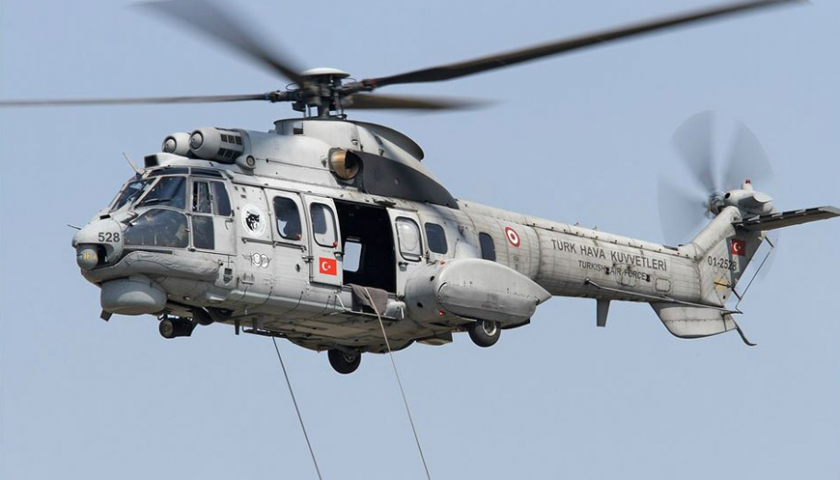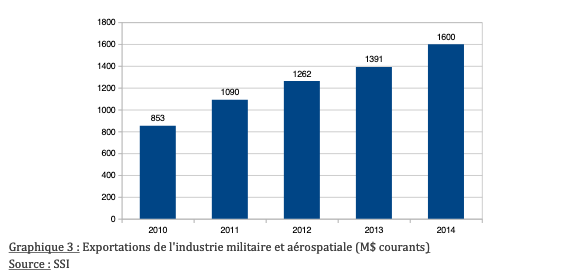Following in the footsteps of the Dutch and German governments, France announced this Saturday, October 12, its decision to suspend “ any project to export to Turkey war materials likely to be used[efn_note]Joint press release from the Minister for Europe and Foreign Affairs and the Minister of the Armed Forces, October 12, 2019[/efn_note] » in Syria. In fact, this European surge should probably have no effect on the smooth running of the Turkish operation.
Started 6 days earlier, the Turkish army's offensive in northeastern Syria continues. Having already caused the displacement of 100.000 people fleeing the fighting, Recep Tayyip Erdogan's Turkey is leading a military operation whose primary objective is to neutralize the Kurdish fighters of the PKK (Kurdistan Workers' Party) - considered as a terrorist by Ankara – and those of the YPG (People's Protection Units) – armed branch of the Syrian PYD (Democratic Union Party).
However, the Syrian Kurds played a crucial role in the fight against the Islamic State and its members now detained in large numbers by the Kurdish authorities, including 2.000 foreign jihadists, some from Europe. Repeatedly warning of a resurgence of the Islamic State (IS) if the Turkish offensive were to materialize, the Kurds do not have sufficient numbers to both fight the Turkish armed forces and keep 10.000 Islamist fighters in captivity. and their loved ones. In this regard, the Syrian Observatory for Human Rights (OSDH) confirmed the information according to which around a hundred IS women and children – of foreign nationality – are said to have fled from the Aïn Issa camp[efn_note]OSDH, “The pro-Turkey factions kill more citizens north of Al-Raqqah and more families of ISIS members flee Ayn Issa Camp”, October 13, 2019[/efn_note], in northern Syria, located near the fighting between Kurdish and Turkish forces.
For the European states which supported the Kurdish militias in their fight against ISIS – like France and the United Kingdom which deployed special forces in the Syrian theater – the situation is critical and the American withdrawal poses the question of maintaining their forces. A restricted defense council was also held at the Elysée this Sunday evening[efn_note]Laurent LAGNEAU, “Washington withdraws its special forces from Syria; Mr Macron brings together a restricted defense council”, in Opex360.com, October 13, 2019[/efn_note] and Paris should, in the coming hours, take measures “ to ensure the safety of French military and civilian personnel present in the area »[efn_note] »Turkish offensive in Syria. France announces imminent measures to protect its personnel in Syria”, in West France, October 13, 2019[/efn_note]. In view of the situation, several European countries have taken the decision to suspend their arms exports to Turkey, like Norway, the Netherlands, Germany and France. However, this first round of measures is more symbolic than a real retaliatory measure against the Turkish economy.
Indeed, it is appropriate to underline the following reality: Europe exports little military equipment to Turkey. The latter being a major arms producer, Europeans export de facto equipment meeting very specific Turkish capability needs. Most of the French equipment used by Turkey consists of Cougar helicopters (Airbus), MILAN and Eryx missiles, as well as Meltem surveillance planes (Thalès) which are not used for the offensive in northern Syria. . Ankara does not even appear in the top 20 clients of Paris, representing an amount of 461,7 million euros between 2009 and 2018. A far cry from the 11,3 billion euros spent by Riyadh over the same period. Suffice it to say, paltry, barely a customer.

With our German neighbor, the proportions are quite different. Turkey is one of the largest buyers of German weapons. In particular, it has more than 350 tanks Leopard 2A4 manufactured by the Bavarian group Krauss-Maffei Wegmann (KMW) and exported since 2005 to Turkey[efn_note]Cecile BOUTELET, “The embarrassing success of weapons made in Germany”, in Le Monde, February 27, 2018[/efn_note]. Berlin had already used these tanks to put pressure on Ankara two years earlier, then blocking the modernization program of said Turkish tanks[efn_note] »Germany again supplies military equipment to Turkey", in Nemrod-ecds.com, 2017[/efn_note]. However, despite being a major supplier to Ankara, volumes remain reasonable, i.e. 250 million euros for the year 2018 and 180 million euros over the first four months of 2019.
In addition, the Turkish arms industry is considered an emerging defense industrial and technological base (BITD), like that of India, Brazil and even South Korea. She begins to manufacture equipment independently and even manages to export them. This dynamic can be explained by a Turkish desire to disengage from a form of dependence on American equipment which still remains significant within the country's armed forces. Thus economic sanctions from Washington[efn_note]AFP, “Turkey faces 'hellish sanctions' from Washington”, in Point, October 10, 2019[/efn_note] would be much more able to put pressure on the Turkish authorities even if this option seems, at present, implausible.
But although often calling on foreign partners for the most important equipment (combat aircraft, submarines, helicopters), Ankara's current policy regularly gives priority to a prime contractor of Turkish nationality for programs of armaments. For example, the aircraft manufacturer Turkish Aerospace Industry – supported by BAE Systems – is at the head of the program for the future national combat aircraft of 5e generation, the TF-X[efn_note]Fabrice WOLF, “Turkish ambitions revealed with the TF-X model”, in Meta-Defense, June 16, 2019[/efn_note] (for Turkish Fighter Experimental). This combat fighter has the declared ambition of replacing the Turkish F-16 fleet – made in the United States – with 250 aircraft. What's more, since the mid-1980s, the country has been pursuing an ambitious industrial policy of defense and modernization of its armed forces, a true development model based on a desire for strategic autonomy. Indeed, through a policy ofoffset – formidable lever for acquiring skills and establishing businesses – but also an R&D financing policy coupled with an incentive for the development of its BITD, Ankara has endeavored to create a national industrial base which, although still experiencing certain capacity deficits, is today bearing fruit by giving it a more solid strategic and political base on the military level.[efn_note]Sofia LEFEEZ, “THE TURKISH DEFENSE INDUSTRY: a development model based on a desire for strategic autonomy”, Institute of International and Strategic Relations, April 2017[/efn_note]. Thus, it is not surprising that the country's armed forces are equipped up to 60% by the national BITD[efn_note] “Turkey produces 60% of its army’s equipment”, in Anadolu Agency, September 15, 2015 [/efn_note].

Thus, in light of these developments and in view of the volume of arms exports from Europe to Turkey, the economic sanctions decided by Paris, Berlin, The Hague and Oslo will have no concrete impact and will in no way slow down the Turkish offensive. On closer inspection, the most relevant answer probably lies in the suspension of Turkish exports to Europe. As Turkey's domestic market can hardly absorb more materials from national production, Turkish manufacturers are seeking to increase their market shares in foreign countries, particularly in the West[efn_note] »Türkiye: record exports from the defense and aeronautics industry", in Establishment of Turkish Radio and Television, October 7, 2019[/efn_note]. Targeting the Turkish BITD and its advances in the technical and commercial fields would therefore constitute a stronger response against Ankara. For the moment, the European response remains minimalist but above all disparate, mainly directed towards public opinion much more concerned by what is happening in Syria than in Yemen.
Axel Trinquier – specialist in European defense issues.
